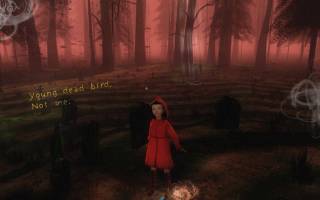In a blog post made Sunday, Belgium-based independent developer Tale of Tales announced that in the wake of the poor sales of their latest title, Sunset, the studio would “no longer be making commercial games.”
Tale of Tales, the two person studio made up by Auriea Harvey and Michaël Samyn, has spent the last twelve years developing a unique catalog of games that pushed at the boundaries of what we traditionally call video games. In some titles, like The Endless Forest and Bientôt l'été, Tale of Tales offered players a strange mix of interlocking systems and allowed them to find their own meaning. In games like The Path and Fatale, the studio leveraged well known stories to subvert player expectations.
In their blog post, Harvey and Samyn address the "failure" of their most recent release, Sunset. Despite a development philosophy and marketing strategy tuned to connect the game to a broader audience, the game sold only "a little over 4,000 copies" to date, including units sold to backers of the game's Kickstarter.
Honestly, I'm still working through this announcement. There are a lot of angles to think about here, and it's one of those moments that brings into focus the broader state of video games.
On one hand, there has been a serious increase in the number of independent, experimental, and avant garde games in the time since Tale of Tales was first founded. The company's contribution to that growth shouldn't be underestimated. But at the same time, this case is a reminder that those experimenting with the form of video games often do so by taking great financial risks, and that means putting additional pressure on them to make not only games, but marketable products.
Tale of Tales clearly felt that pressure. Part of the studio's goal with Sunset was to appeal to wider audience, instead of just to the small group of fans who enjoy their particular breed of art games. Presumably, Harvey and Samyn were targeting the players who purchased games like Gone Home and Dear Esther, titles which may indicate there is room in the market for small games focused on exploration and story. Tale of Tales wanted to reach this audience because they wanted to share their creative vision with a bigger group of people, but also because of what they call the "drying up of funding for artistic videogames in Belgium."

Over at Forbes, reporter Daniel Nye Griffiths shined some light on the shift in public funding. For a while, Belgian game creators like Tale of Tales were able to find public funding through the Flanders Audiovisual Fund's "experimental media" funding category. That changed with the establishment of a dedicated games fund, but as Griffiths writes, "ironically, this has made funding harder to secure" for studios like Tales of Tales.
I reached out to get the developer's perspective on why that is, and Samyn explained:
Previously we had to submit our grant proposals to a film commission. Which was a bit weird but at least they judge our proposals on artistic merit. And they have rejected a few as well. The new Game fund consists of game industry professionals. Let's just say that it's easier to explain games to art people that to explain art to games people.
There's also a few rules in the Game fund that are different and less art-minded than those of the Film fund. Like they will only cover up to 50% of your production budget, eg, as opposed to up to 85% if you make a film.
Government support for the arts is sadly dwindling as right wing politicians take control. If we don't want to lose civilization entirely, something needs to be done to support more non-commercial art. The game industry, with its much touted millions of dollars, could easily cause a global cultural revolution by spending a tiny fraction of its budgets on a few promising artists. Maybe some of the more forward looking studios and publishers will start realizing this soon. There's a lot to be gained from expanding the market and improving the social and cultural esteem for games, including dollars.
Whether or not you hold the same love for non-commercial art as Samyn, his broader concerns about systems of public funding shine light on an important (and rarely talked about) part of the games industry. For consumers, things like the Flanders Audiovisual Fund exist unseen. But for many studios (both large and small), mechanisms like arts funds and tax credits offer the ability to hire up and take exciting risks on projects that would otherwise be out of reach. These economic incentives can work to improve local economies, to attract talent from distant places, or to encourage the development of a region's local culture.
Of course, there's a lot of debate about what "good" public funding is. If you're interested in what different funding models look like, this Jason Della Rocca piece from a few years ago does a good job of outlining the differences between incentives, funds, and facilitation. Rocca also shows into how these models affect big studios differently than smaller Canadian studios like Polytron and Klei, and while the specifics are different, you can see similarities between what Samyn told me and what independent developers told Rocca: The majority of public support that exists encourages the creation of games that fit into the current market, and established players in the industry (and not up and coming devs) are better suited to obtaining and using that funding.

Even with unpredictable and inconsistent funding, there has been a boom in small, independent, and alternative games. In the 12 years since Tale of Tales was founded, new tools like Unity, GameMaker, and Twine have allowed for more affordable game development. And audiences have begun to test the waters of new sorts of games, too. Some people who never thought there were games for them now find themselves hotly anticipating summer and holiday sales, or browsing sites like Merritt Kopas' Forest Ambassador in search for free games. Others find themselves just as excited to play the explosion filled Just Cause 3 as they are to play narrative-driven Firewatch or the "casual" Regency Solitaire.
Yet every year, around E3, I feel like we have this conversation: "Why do so many games feel so focus tested, so same-y?" And the answer is (again and again) the same: "Because it's risky to take chances." So I find myself wondering: What if there was more consistent, predictable funding? What if small studios had access to the same sorts of public support that some major developers do? And hey, what if those major developers had more support, too? How might that encourage a little bit of creative risk taking? A new IP instead of another sequel? The adoption of new, expensive technologies like VR? Maybe (could you imagine?) a little less 'crunch.'
It's easy to convince ourselves that the current boom of interesting, new kinds of games will continue on automatically. But Tale of Tales' shift away from the commercial space should remind us that changes in the way games are made and consumed reflect the actual, material conditions of their production. Game development is affected by everything from technological accessibility to channels of distribution, from copyright law to tax policy, from market trends to the availability of public funding. Many of these go unnoticed by us, and all of them are subject to change.
Those of us who care about games have advocated for their importance for a long time, but it's often the case that we're more passionate than we are clear. I know that in the past I've found myself hoping to deliver a clear argument about the value of games, only to instead wind up offering a vague plea to be taken seriously. But with enough education about the "hows" and "whys" of game development, we'll all be better equipped to argue not only for the value of games, but for the structural support the medium needs to continue to blossom.